- Home
- Dan Simmons
Darwin's Blade Page 3
Darwin's Blade Read online
Page 3
“Don’t cars always do that when they go off cliffs and things?” said Elroy, his twist of a smile fading.
“Only in the movies, Mickey, my boy,” said Cameron. He turned to Dar. “Well? You want to get started on this before it gets hot up here?”
Dar nodded. “On two conditions.”
Cameron raised his heavy eyebrows.
“Get me back down to my car and loan me your radio.”
Dar drove the NSX out of the canyon and into the desert, stopped, looked around for a while, drove farther, looked a bit longer, drove back to his first stopping point, and walked out into the desert, gathering pebbles and other small items and putting them into his pocket. He shot some images of the Joshua trees and the sand, then walked back to the car and took a few more images of the asphalt road. It was still early and the traffic was light—a few vans and pickups—so there was no backup from the single-lane closing in the canyon. But it was already eighty degrees in the desert and Dar took off his jacket and kept the air-conditioning going as he sat in the idling black Acura on a gravel turnout two miles from the entrance to the canyon.
Dar powered up his IBM ThinkPad, downloaded the stored images from the Hitachi digital camera via a flash card, and scrolled through them for a few minutes. He ran the short video segments he had shot. Then he enabled his numeric keypad and tapped in equations for several minutes, exiting once to activate map software and the GPS unit he carried in the glove box. He double-checked distances, angles, and elevations, and then finished his arithmetic, shut down the computer, stowed it away, and called Cameron on the radio he had borrowed. It had been thirty-five minutes since he’d left the ledge.
The green and white chopper buzzed by once and landed five minutes later. The pilot stayed inside his bubble while Cameron got out, adjusted his hat, and walked over to the NSX.
“Where’s young Elvis?” said Dar.
“Elroy,” said the sergeant.
“Whatever.”
“I left him behind. He’s had enough excitement this morning. Besides, he was being disrespectful of his elders.”
“Oh?”
“He called you an arrogant A-hole after you left,” said Cameron.
Dar raised one eyebrow. “A-hole?”
The fellow ex-Marine shrugged. “Sorry, Darwin. It’s the best the boy could do. He’s never been in the military. Generation Xer and all that. And he’s white. Linguistically deprived. I apologize for him.”
“A-hole?” said Dar.
“What do you have for me?” Cameron was obviously tired and edging out of his amused mode into his more habitual pissed-off attitude.
“What do I get for having anything for you?” said Dar.
“The eternal gratitude of the California Highway Patrol,” growled Cameron.
“I guess it’ll have to do.” Dar squinted at the little helicopter that seemed to shimmer as heat waves rose from the highway between it and the NSX. “As much as I hate to get in that goddamn thing again, I think it’ll be easier to show you if we go back up for a couple of minutes.”
Cameron shrugged. “Crash site?”
“Uh-uh. I’m not flying in that canyon again. Just tell your man to follow my directions and to keep it under five hundred feet.”
They hovered above the highway half a mile east of where the NSX was parked. “Did you see that scorched, rippled pattern on the asphalt here near the turnout?” said Dar through his headset microphone.
“Yeah, sure, now I do. Not when I drove this way in the dark this morning. So what? Highway’s fucked up like that in a thousand places. Shitty maintenance out here.”
“Yes,” said Dar, “but stretches of the road here look as if they’ve been melted and then resolidified.”
Cameron shrugged, “Desert, man. Going to be what today?” He turned to the pilot.
“A hundred and twelve,” said the pilot, never moving his sunglasses in their direction, his attention on the instruments and the horizon. “Fahrenheit.”
“OK,” said Dar. “Let’s head back toward the NSX.”
“That’s it?” said Cameron.
“Patience.”
They hovered three hundred feet above the highway. A station wagon rushed past headed west, kids’ heads poking out of both rear windows, goggling at the helicopter. The Acura looked like a black, wax candle that had melted in the heat.
“Notice those skid marks?” said Dar.
“When we flew down, sure,” said Cameron. “But they’re a mile and a half from the canyon. More than two miles from the crash site. You saying that somebody ran out of control, left skid marks here, and crashed almost three miles away, two hundred feet up a canyon wall? Fast motherfucker.” The sergeant was smiling, but he was not amused.
“Long skid marks,” said Dar, pointing to the parallel tracks heading off west.
“Kids burning rubber. Find tire marks every few hundred meters out here. You know that, Dar. Just lucky if we don’t find the kids in the wreckage the next morning.”
“I measured them,” said Dar. “One thousand eight hundred and thirty-eight feet of nonstriated road marks. If it was a kid doing peel-outs, he did one hell of a long wheelie and left most of his tires on the asphalt. If it’s skid marks…”
“What are you saying?” said Cameron.
“Simple matter of friction coefficient. Our El Camino tried to stop here and couldn’t. Brakes melted.” Dar fished in his pocket and handed Cameron several tiny pellets and spheres of what looked to be melted rubber.
“Brake pads?” said Cameron.
“What’s left of them,” Dar said, and handed the sergeant several more tiny droplets. These were tiny pellets of metal. “These are from the surfaces of the actual brake drums melting,” he said. “The Joshua trees along this stretch are dusted with both powdered rubber and melted steel.”
“El Caminos never had brakes worth shit,” said Cameron, shifting the pellets in his dark palm.
“No,” agreed Dar. “Especially when you’re trying to haul your speed down from somewhere around three hundred miles per hour.”
“Three hundred miles per hour!” said the CHP sergeant, his jaw dropping slightly.
“Land this thing,” said Dar. “I’ll explain outside.”
“I think he did it after dark because he didn’t want anyone seeing him attach the JATO units back at that turnout,” said Dar. “And then—”
“JATO units!” said Cameron, taking his hat off and rubbing the sweat liner with his fingers.
“Jet Assist Take Off units,” said Dar. “They’re essentially just large, strap-on, solid-fuel rockets that the Air Force once used to get heavy cargo planes off the ground when the runway was too short or the load was too—”
“I know what the fuck JATO stands for,” snapped Cameron. “I was in the Corps, man. But where would some dickweed with an ’82 El Camino get two of those?”
Dar shrugged. “Andrews Air Force Base just north of here. Twelve Palms just down the road. More military bases around here than any other comparable patch of real estate in the United States. Who the hell knows what military surplus they sell for scrap or whatever.”
“JATO units!” said Cameron, looking at the endless skid marks again. They weaved in several places, but recovered and then headed straight as a double-shafted, black arrow for the distant canyon. “Why’d he use two?”
“One wouldn’t have done him much good unless he sat on it,” said Dar. “If he lit off just one and it wasn’t positioned perfectly on the El Camino’s exact center of mass, the vehicle would’ve just spun like a Catherine wheel until the rocket dug or melted him a hole in the desert.”
“All right,” said Cameron. “He strapped or bolted or cinched on two of these Air Force surplus rocket fuckers. Then what?”
Dar rubbed his chin; he had neglected to shave in the rush to get going. “Then he waited for a break in traffic and lit them. Probably a simple battery circuit. Once they’re lit, you can’t shut them off. They’re ess
entially just oversized skyrockets, like miniature versions of the two strap-on boosters that the space shuttle uses. Light ’em and go. No turning back.”
“So he turned into a space shuttle,” said Cameron, his expression strange. He looked at the mountains two miles away. “Airborne all the way into that rock wall.”
“Not all the way,” said Dar, turning on the ThinkPad and pointing to some delta-v estimates. “I can only guess at the thrust those things put out, but the rocket flare melted those patches of the highway back there and probably got him up to about two hundred and eighty-five miles per hour at just the point these skid marks begin, about twelve seconds after ignition.”
“Helluva ride,” said Cameron.
“Maybe the kid was going for a land speed record,” agreed Dar. “About this point, with the telephone poles flashing past in the dark like a picket fence—the rocket blast would’ve illuminated them—our boy had second thoughts. He slammed on the brakes.”
“Lot of good it did him,” said Cameron. The sergeant was almost whispering now.
“Brake linings melted,” agreed Dar. “Brake drums melted. Tires started coming apart. You notice that just the last hundred meters or so of road marks are intermittent.”
“Brakes going on and off?” said Cameron, his voice filling now with the future pleasure of telling and retelling this story. Cops loved roadkill.
Dar shook his head. “Nope. These are just tire-melt patches at this point. The El Camino is taking thirty and forty-foot hops before becoming completely airborne.”
“Holy shit,” said Cameron, sounding almost gleeful.
“Yes,” said Dar. “There’s a final melt point just beyond where the tire marks cease. That’s where the JATO units were burning down at a nice healthy thirty-six-degree takeoff angle. The El Camino’s climb ratio must have been impressive.”
“Fuck me.” The sergeant grinned. “So those candles burned all the way to the cliff wall?”
Dar shook his head. “My guess is that they burned out about fifteen seconds after takeoff. The rest of his ride was pure ballistics.” He pointed to the GPS map on the ThinkPad’s screen, with the simple equations to the right of the arching trajectory from desert to canyon wall.
“The road turns and starts climbing where he impacted,” said Cameron.
Dar winced slightly. He hated the verb-use of nouns such as impact. “Yeah,” he said. “He didn’t make the turn. The El Camino was probably spinning around its own horizontal axis at this point, giving it some flight stability during the descent.”
“Like a rifle bullet.”
“Precisely.”
“What do you think his…can’t think of the word…high point was?”
“Apogee?” said Dar. He looked at the computer screen. “Probably no less than two thousand and no more than twenty-eight hundred feet above the desert floor.”
“Holy shit,” whispered Cameron again. “It was a short trip, but it must have been one hell of a ride.”
Dar rubbed his ear. “I figure that after the first fifteen seconds or so, our guy was just a passive bystander, no longer a participant.”
“What do you mean?”
Dar touched the screen again. “I mean that even at the lowest boost rates I can plot to get him from here to there, he was pulling about eighteen g’s when he left the asphalt. A two hundred pound guy would have…”
“Had the equivalent of three thousand four hundred extra pounds sitting on his face and chest,” said Cameron. “Ouch.”
The sergeant’s radio squawked. “Sorry,” he said. “Gotta take this.” He stepped away to listen to the rasping and squawking while Dar turned off his computer and stored it in the cabin of the NSX. The car was idling again to keep the air-conditioning going.
Cameron stepped closer. His expression was a queer mixture of a grin and a grimace. “Forensics boys just excavated the steering wheel of the El Camino from the crater,” he said softly.
Dar waited.
“Finger bones were embedded in the plastic,” finished Cameron. “Deeply embedded.”
Dar shrugged. His phone chirped. He flipped it open, saying to the CHP sergeant, “This is what I love about California, Paul. Never out of a cell. Never out of touch.” He listened for a minute, said, “I’ll be there in twenty minutes,” and flipped the phone shut.
“Time to go to work for real?” said Cameron, grinning now, obviously phrasing the telling and retelling of this for future days.
Dar nodded. “That was Lawrence Stewart, my boss. He’s got something for me that sounds weirder than this shit.”
“Semper Fi,” said Cameron, to no one in particular.
“O seclum insipiens et inficetum,” said Dar, to the same audience.
CHAPTER TWO
“B IS FOR BUD”
IT TOOK DAR less than fifteen minutes to drive to the crossroads truck stop–cum–Indian casino to which his boss, Lawrence Stewart, had asked him to hurry at all possible speed. In the NSX, with radar detector pinging fore and aft and sideways, all possible speed meant 162 miles per hour.
The truck stop was west of Palm Springs, but was not one of the major Indian casinos that rose up out of the desert like giant adobe fake-pueblo style vacuum cleaners set there to suck the last dime out of the last Anglo sucker’s pocket. This was a run-down, seedy little truck stop that looked as if it had hit its heyday about the same time Route 66 was booming (even though this one was nowhere near Route 66), and the “casino” was little more than a back room with six slot machines and a one-eyed Native American dealing blackjack on what seemed to be a twenty-four-hour shift.
Dar spotted Lawrence right away. His boss was hard to miss—six two, about 250 pounds, with a friendly, mustached face that at the moment seemed quite flushed. Lawrence’s ’86 Isuzu Trooper was parked away from the pumps and the open garage doors, on a heat-rippled strip of concrete just catty-corner from the truck-stop diner.
Dar looked for some shade to park the NSX in, found none, and pulled it into the shadow of Lawrence’s sport utility vehicle. One glance showed him that something was odd. Lawrence had taken out the Isuzu’s left “sealed beam unit” or SBU—car-guy talk for headlight assembly—and carefully laid the bulb and other pieces on a clean work cloth on the Isuzu’s high hood. At the moment Lawrence’s right hand was deep in the empty headlight socket, his left hand was fussing with his right wrist as if the truck had grabbed him, and he was on his cell phone—his ear pressed heavily to his shoulder so that the phone wouldn’t drop. He was wearing jeans and a short-sleeved safari jacket that he had sweated through in the chest area, under the arms, and down the back. Dar looked again and realized that Lawrence’s round face not only looked flushed, it looked red to the point of impending coronary.
“Hey, Larry,” said Dar, slamming the NSX door behind him.
“Goddammit, don’t call me Larry,” rumbled the bigger man.
Everyone called Lawrence Larry. Dar had once met Lawrence’s older brother, a writer named Dale Stewart, and Dale had said that Lawrence-Don’t-Call-Me-Larry had been fighting that losing battle over his name since he was seven years old.
“OK, Larry,” agreed Dar amiably, walking over to lean on the right fender of the Isuzu, careful to keep his elbow on the work cloth and not the burning-hot metal. “What’s up?”
Lawrence stood upright and looked around. Sweat was running down his cheeks and brow and dripping onto his safari shirt. He nodded slightly toward the plate-glass window of the diner. “See that guy on the third stool in there—No, don’t turn your head to look, damn it.”
Dar kept his face turned toward Lawrence while he glanced at the long window of the diner. “Little guy with the Hawaiian shirt? Just about finished with…what?…scrambled eggs?”
“That’s him,” said Lawrence. “Bromley.”
“Ahh,” said Dar. Lawrence and Trudy had been working on a stolen-car-ring case for four months. Someone had been stealing only new rental cars from one of their corporate c
lients—Avis in this case—and then repainting the vehicles, shipping them across state lines, and reselling them. Charles “Chuckie” Bromley had been under surveillance for weeks as the ring’s number one car thief. Dar had had nothing to do with the case until now.
“That purple Ford Expedition over there with the rental plates is his,” said Lawrence, still holding the phone to his shoulder by force of jowl. Dar heard squeaks coming from the cell phone and Lawrence said, “Just a minute, honey, Dar’s here.”
“Trudy?” said Dar.
Lawrence rolled his eyes. “Who else would I call honey?”
Dar held up both hands. “Hey, your personal life is your own, Larry.” He smiled while he said it because he knew no other couple as committed to each other and dependent upon one another as Lawrence and Trudy. Officially, Trudy owned the company, and the couple worked sixty-to eighty-hour weeks, living, breathing, talking, and evidently thinking about little other than insurance adjusting and the ever-mounting caseload they were carrying.
“Take the phone,” said Lawrence.
Dar rescued the Flip Phone from between Lawrence’s sweaty cheek and shoulder. “Hey, Trudy,” he said to the phone. To Lawrence he said, “I didn’t know Avis rented purple Expeditions.”
Normally Trudy Stewart sounded pleasantly businesslike and very busy. Now she sounded very busy and very irritated as she said, “Can you get that idiot free?”
“I can try,” said Dar, beginning to understand.
“Call me back if you have to amputate,” Trudy said, and hung up.
“Damn,” muttered Lawrence, glancing over at the diner where the waitress was taking Bromley’s plate away. The little man was sipping the last of his coffee. “He’s going to be leaving in a minute.”
“How’d you do that?” asked Dar, nodding at where Lawrence’s right hand disappeared into the headlight opening.
“I’ve been tailing Bromley since before sunrise and I realized that I only had one headlight working,” said Lawrence.
“Not good,” agreed Dar. People noticed one-eyed cars in their rearview mirrors at night.

 The Terror
The Terror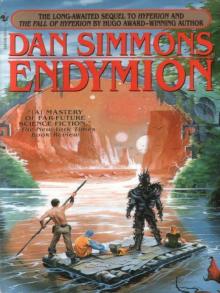 Endymion
Endymion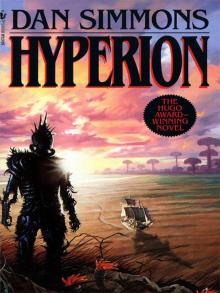 Hyperion
Hyperion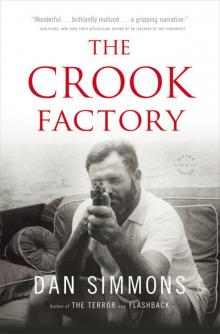 The Crook Factory
The Crook Factory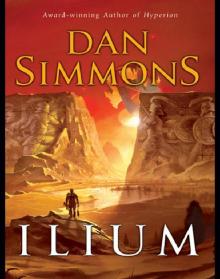 Ilium
Ilium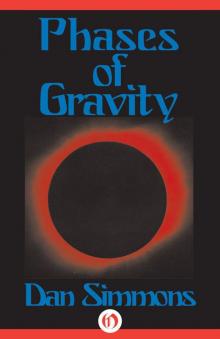 Phases of Gravity
Phases of Gravity Hardcase
Hardcase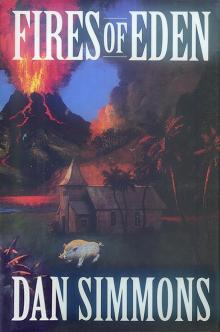 Fires of Eden
Fires of Eden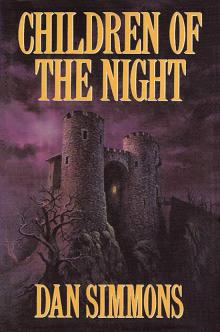 Children of the Night
Children of the Night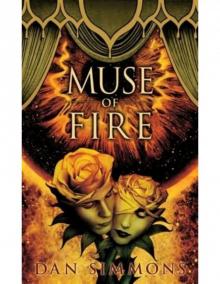 Muse of Fire
Muse of Fire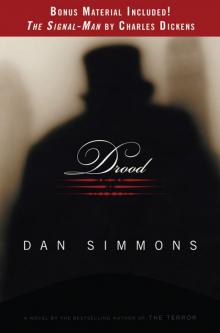 Drood
Drood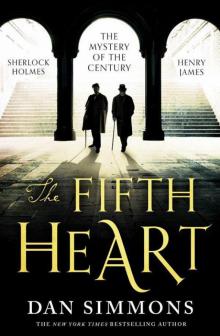 The Fifth Heart
The Fifth Heart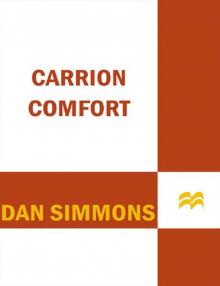 Carrion Comfort
Carrion Comfort The Hollow Man
The Hollow Man Summer of Night
Summer of Night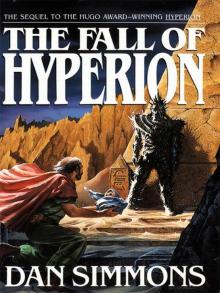 The Fall of Hyperion
The Fall of Hyperion Black Hills
Black Hills A Winter Haunting
A Winter Haunting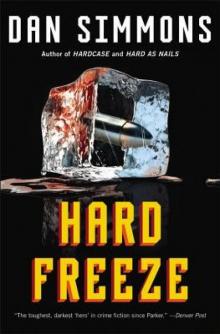 Hard Freeze
Hard Freeze Prayers to Broken Stones
Prayers to Broken Stones Hard as Nails
Hard as Nails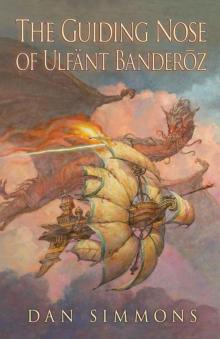 The Guiding Nose of Ulfant Banderoz
The Guiding Nose of Ulfant Banderoz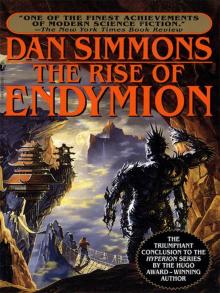 The Rise of Endymion
The Rise of Endymion Orphans of the Helix
Orphans of the Helix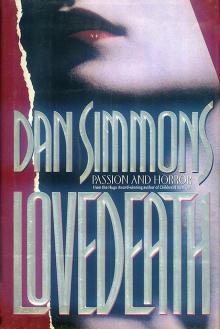 Lovedeath
Lovedeath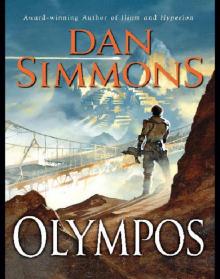 Olympos
Olympos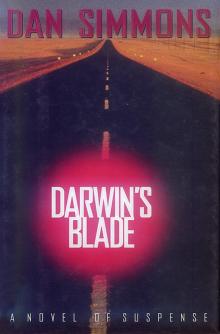 Darwin's Blade
Darwin's Blade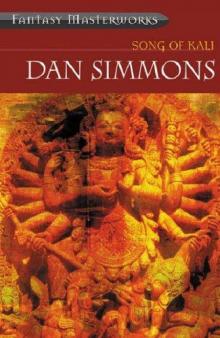 Song of Kali
Song of Kali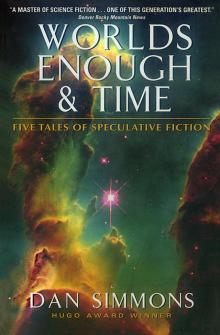 Worlds Enough & Time: Five Tales of Speculative Fiction
Worlds Enough & Time: Five Tales of Speculative Fiction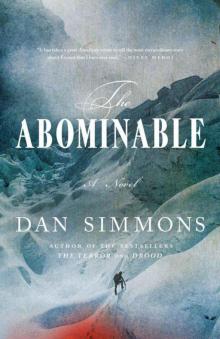 The Abominable
The Abominable The Death of the Centaur
The Death of the Centaur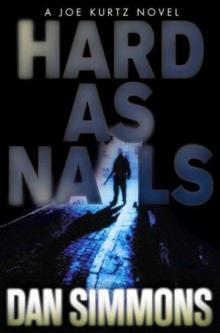 Hard as Nails jk-3
Hard as Nails jk-3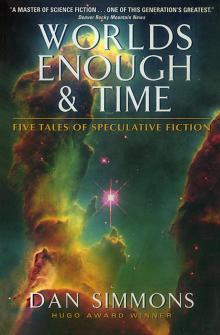 Worlds Enough & Time
Worlds Enough & Time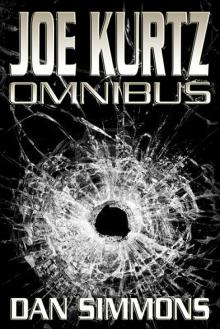 Joe Kurtz Omnibus
Joe Kurtz Omnibus The Hyperion Cantos 4-Book Bundle
The Hyperion Cantos 4-Book Bundle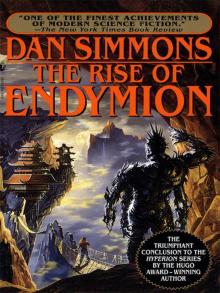 Rise of Endymion
Rise of Endymion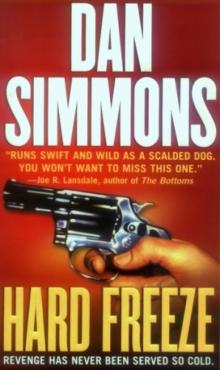 Hard Freeze jk-2
Hard Freeze jk-2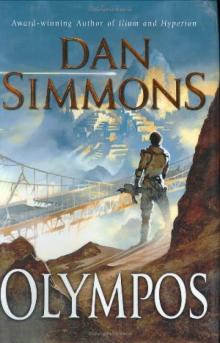 Olympos t-2
Olympos t-2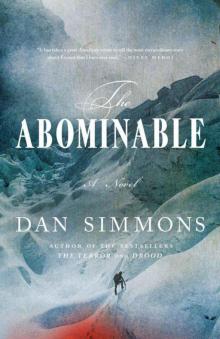 The Abominable: A Novel
The Abominable: A Novel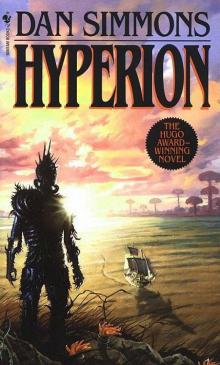 Hyperion h-1
Hyperion h-1 Remembering Siri
Remembering Siri Black Hills: A Novel
Black Hills: A Novel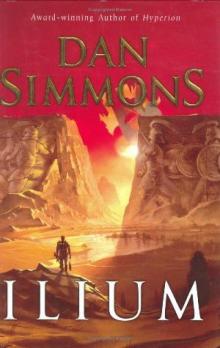 Ilium t-1
Ilium t-1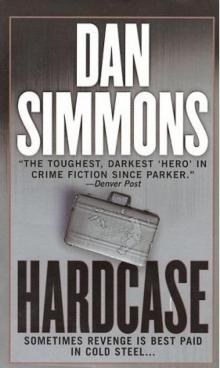 Hardcase jk-1
Hardcase jk-1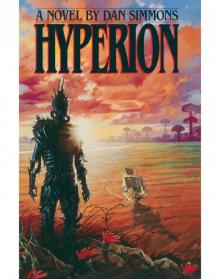 Hyperion 01 - Hyperion
Hyperion 01 - Hyperion